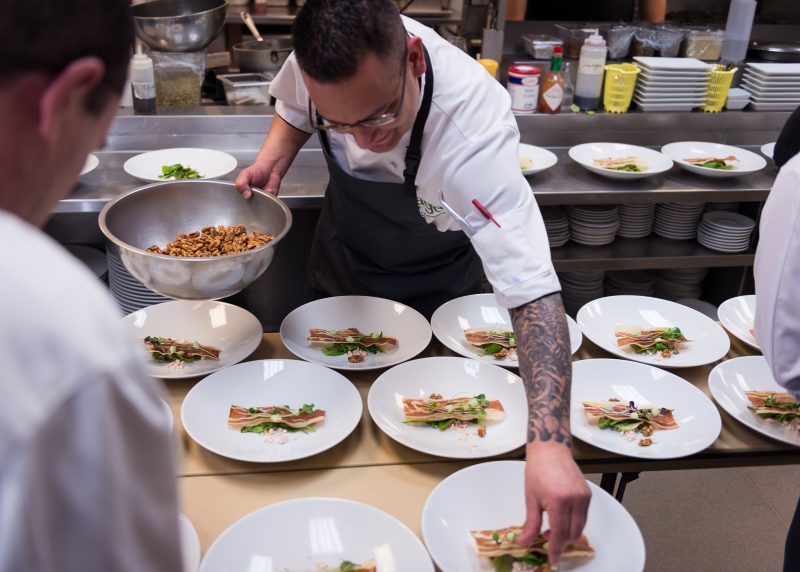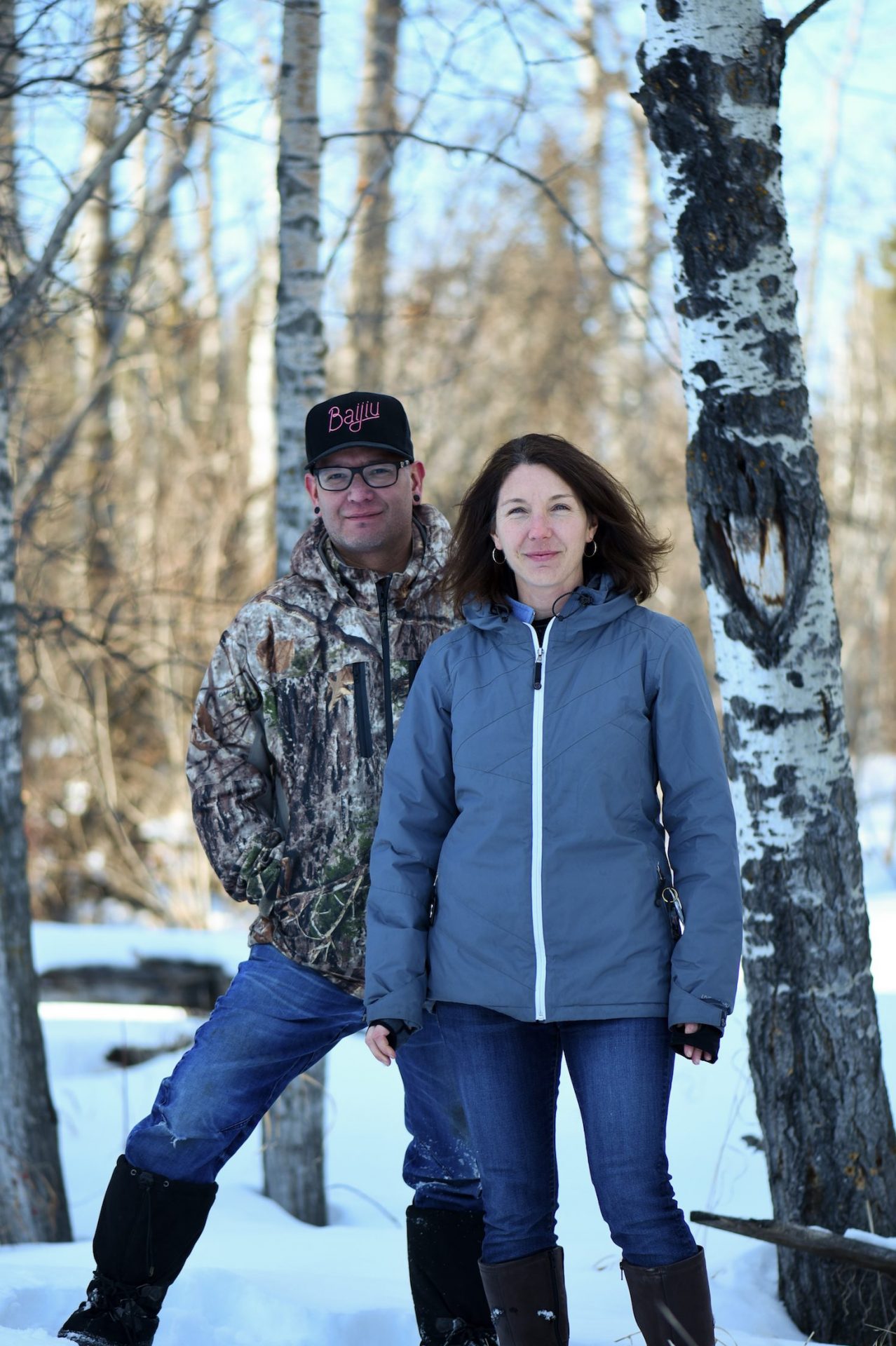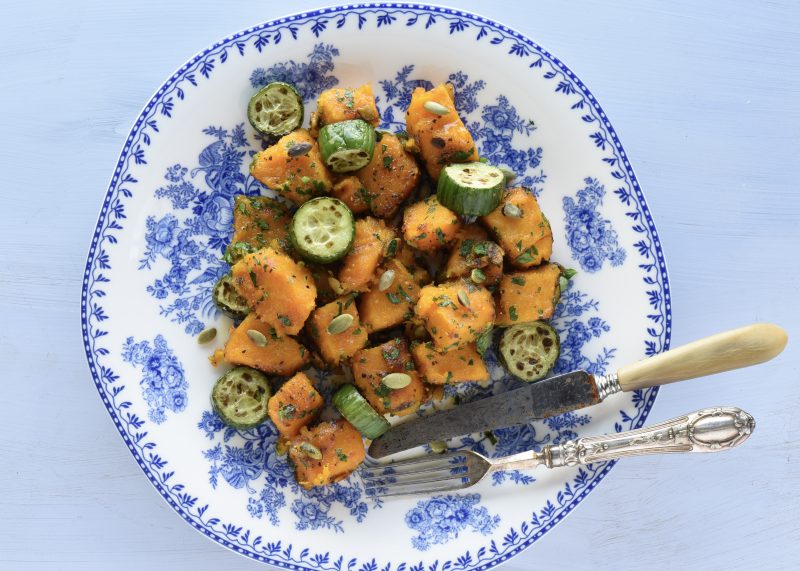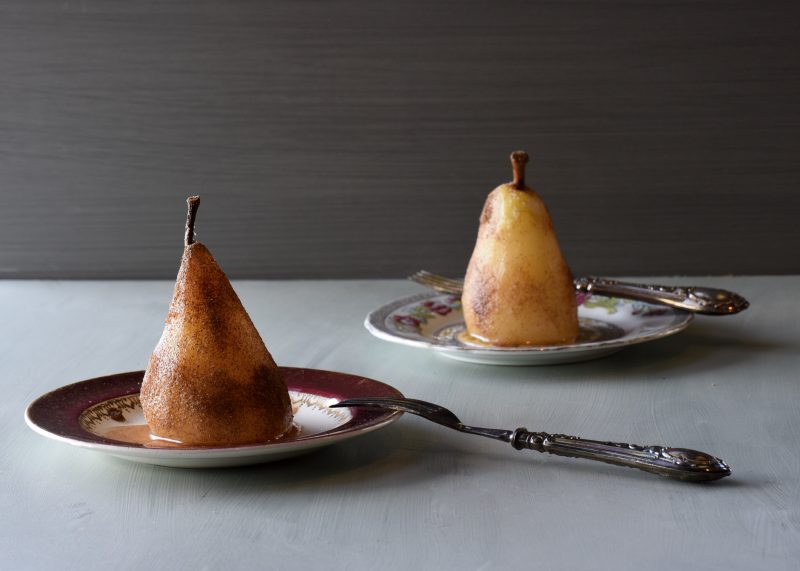This article originally appeared in the Winter 2021/2022 print issue of Quench Magazine.
There are more than a few notable chefs out there, but how many can boast inclusion in a colouring book?
Shane Mederic Chartrand of the Enoch Cree Nation, west of Edmonton, Alberta, Treaty 6, can make that claim. There he is, arms crossed in his chef jacket, among the pages of Indigenous Legends: Extraordinary Natives from A to Z, an all-ages coloring book by Henry RedCloud Andrade. That was back in 2017. Since the release of his first cookbook, tawâw: Progressive Indigenous Cuisine (House of Anansi, 2019) he’s been featured on BBC World Service, Australian public media, as well as various television documentaries and cooking shows like Wall of Chefs, Iron Chef Canada, and the Red Chef Revival documentary series. In 2021, he was chosen to represent Canada for the United Nation’s Recipe for Change campaign through its International Fund for Agricultural Development.
Shane fields insane volumes of requests for yet-another media interview, or to be on a podcast, or a television show, or any manner of the COVID-shift virtual appearance new reality. I get swept along too, as the ghost writer who became the cookbook’s co-author. Together we marvel that two years after its launch, tawâw is still part of our daily work, and that it has taken on a larger existence than either of us ever imagined from the fixed short lens of just trying our best to hit a cookbook deadline and make something that we could be proud to call our best effort.
We talked by phone recently about this “tawâw afterlife” phenomenon when I found an old voice memo we recorded shortly after we got the book deal. We were two years into circling around the idea of writing a cookbook, and another two full years before we went to print.

Jennifer: Did you get the audio file from October 2017 that I found on my phone and sent to you?
Shane: It’s crazy. I just listened to it.
Jennifer: Yes, it’s fascinating to hear us talking about a book that is so much a part of our lives now, but in that conversation, it hadn’t been written yet.
Shane: All I can say is that where we were heading is not where we ended up. First of all, I didn’t think it would happen. I didn’t believe I had it in me to make it happen.
Jennifer: That’s what was so amazing. We’re totally in the weeds. We’re still throwing
around ideas for the major visual elements of the book. But then, I ask you why we are writing the book and in that moment, your tone changes completely. You have total conviction and precision when you reply, We’re writing this book to embrace a massive, positive message: there’s beauty and creativity in the Indigenous world, and that it’s for everybody to celebrate. I have stories, friendships, recipes, and protocol that we need to expose to Indigenous and non-Indigenous people that I want to share.
Shane: It was about the message, and that didn’t change from day one.
Jennifer: Yes, even though we didn’t know which recipes were going to be in the book, or how the elements would come together, your response gave me a lot of information and
direction. And the confidence that we would get there. You gave tawâw the “why,” but neither of us knew the “how.” That was scary.
Shane: It was scary! Not like you’re-in-physical-danger-scary, but scary in the sense that I could screw up my career if I write a bad book…if we write a bad book.
Jennifer: I remember feeling so much pressure to get it right for you, for your story, and for what it meant already to so many people that you were writing a big, bold cookbook.
Shane: And we had to tell the truth. Everything had to be realistic. You know, we weren’t going to be pretending that we go out and shoot crossbows, you know what I mean? And with a cookbook, or any book, I now know that the big thing is: you can’t fake it.
Jennifer: I know you, so I know your stories and how open you are about sharing them. But I think that many people were surprised at how raw some of the stories are, and how much emotion you share in this book.
Shane: I’m an Aries. Let’s start there. [laughs] I like emotions! My whole life is emotions. If we’re not emotional, we’re just robots.
Jennifer: But you’re not scared to talk about the good and the bad things you deal with in life. You wanted to include stories of being a ‘60s Scoop kid, and of you in foster care in 10 different homes until you were adopted. Did it ever worry you that you were opening yourself up, letting people see your world, your struggles, and your joy?

Shane: I had to. And it’s probably the reason that the book still resonates with so many people. I got a text the other day that we’re changing lives with what this book means to people. Because they’re scared to speak up and speak out. Indigenous people are scared to speak out, but not just Indigenous people. Everyone is scared to talk about what makes them scared, what makes them happy, what makes them strong, what makes them great, what their dreams and passions are. We all have a narrative and a direction, but we also all get lost sometimes.
Jennifer: I think that the fact that we had such a defined vision for the book, about that “massive positive message” really helped keep things on track when we were tired or when our personal lives exploded. We could have both bailed on the cookbook more than once. But in fact, we had such a good time and we got along so well, that it was a good antidote to all the pressure and the fatigue and the personal stuff. I mean there were really only a couple of tense times during the whole five-year process of writing the book. One was when the publisher pushed us, correctly, to change the book title from Marrow to tawâw, the Cree word that encompasses the idea of “welcome, come in, there’s room.”
And then the discussion about having my name on the cookbook cover as co-author. That was a big deal. You’re too generous a person, and for all sorts of reasons, I was pretty adamant that this was your story, your recipes, and your book.
Shane: OK, so the reason why your name is on the cover–I wanted it to actually be bigger than it is–
Jennifer: Well, I have a ridiculous name. It’s too long. It’s six syllables, compared to your three.
Shane: Yes, you did not want your name on the cover until almost near the end when we were going to print! And remember when I was told
early on in the process that I needed to have an all-Indigenous cookbook team? This was not by an Indigenous person, by the way. I said no, I’m finding the best writer I can, the best person for the job. It’s a very interesting book because it isn’t just an Indigenous book. The people in my life are not just Indigenous people. And I want to talk about people as they are, for who they are.
Jennifer: Still, these are your stories and your recipes. It’s your life! But eventually I came to see the role that my name and my involvement could have. That was a way for some non-Indigenous people to see how to celebrate Indigenous food and culture, respectfully and appreciatively.
Shane: And that’s why your name is on the book. Not to mention that it is our book, all the work you did to learn the stories, write down the recipes, make sure they worked. I didn’t know anyone in the literary world. I needed you. The fact that I surround myself with the best people I can think of, helping me get to where I want to be, that’s part of the larger story.
Jennifer: Yes, it wasn’t until we were touring the book and I started seeing how different groups of people responded to it in different ways, then I got it.
Shane: I know, tawâw is still an ongoing idea to me. We’re not done yet. We have to decide what we’re going to do next…realize another dream. It could be a kid’s cookbook. Or just a kid’s story book. It could be a food podcast. Or a television show where you and I go to different Nations and talk to Elders and learn different recipes. How cool would that be?
Jennifer: That would be extremely cool. I feel like we were just at the beginning of learning so much that is out there. And….we need to get even more people into the tawâw army.
Shane: Yes! And that’s the army that needs to take over!
Check out Shane’s recipes for Warm Pumpkin Salad with Seared Cucumber and Toasted Pumpkin Seeds and Wine Poached Pears

Warm Pumpkin Salad with Seared Cucumber and Toasted Pumpkin Seeds 
Wine Poached Pears
Feature Photo Credit: Supplied
Jennifer Cockrall is a food & drink writer residing in Naramata, BC, on unceded Syilx (Okanagan) territory. She writes books about food culture, culinary community, and agriculture. She is currently at work on a book about seed saving and seed banks around the world. Jennifer is always grateful for a meal that someone has cooked for her.


